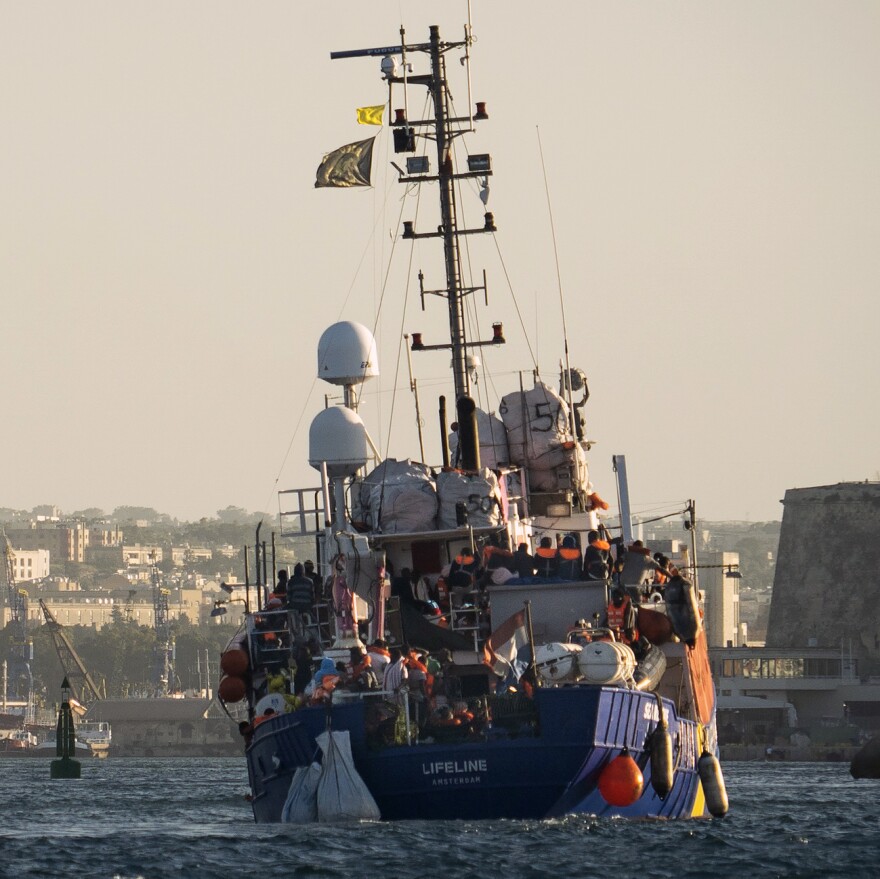A ship operated by a German charity carrying 234 migrants that had languished in the Mediterranean Sea for nearly a week has been allowed to dock in the Maltese port of Valletta after it was initially refused entry.
The Lifeline, run by Germany's Mission Lifeline, was granted permission to dock, but Maltese authorities say the captain, Claus-Peter Reich, will face investigation on charges of failing to turn the rescued migrants over to the Libyan Coast Guard after they were found stranded at sea in inflatable dinghies.
Finally, @MV_LIFELINE arrived in the port! Donate now for our next rescue missions: https://t.co/CWHWb1pTCv pic.twitter.com/h7Ep9OvTg5
— MISSION LIFELINE (@SEENOTRETTUNG) June 27, 2018
French President Emmanuel Macron also criticized the captain, saying he "acted against all the rules," according to The Associated Press.
Malta and Italy's new right-wing, anti-immigrant government, denied the ship entry earlier, but Malta relented on Wednesday.
"Police and doctors met the ship as it docked in Senglea port. Maltese Prime Minister Joseph Muscat said authorities would impound the ship and investigate the crew for operating illegally — including violating rescue protocols and operating without the correct registration.
Mission Lifeline spokesman Ruben Neugebauer said Muscat's legal threat was 'part of the criminalization of NGO activities' by European governments."

Earlier, the German humanitarian group tweeted that many of those aboard the ship were suffering from seasickness and that three of them were being treated in the vessel's sick bay.
Deutche Welle says Muscat did not mention Germany, but that German Interior Minister Horst Seehofer has said his country could take some of the migrants from the ship on the condition that the Lifeline is taken out of action. "We have to stop this from setting a precedent," Seehofer said in Berlin, referring to the Lifeline, according to Deutche Welle.
The case of the Lifeline is just the latest among numerous such incidents involving refugees fleeing North Africa and the Middle East who have sought to reach European shores in recent years. The latest impasse comes just weeks after a similar one involving the ship Aquarius, which carried 629 people and was finally allowed to dock in Spain after being turned away by both Malta and Italy.
A European Union summit convenes in Brussels on Thursday focusing on the EU policy for handling the migrant crisis, which has strained regional governments and set off an anti-immigrant backlash across the region.
As The Associated Press notes, "Italy's new, hard-line interior minister, Matteo Salvini, has been instrumental in raising the level of confrontation, closing Italian ports to humanitarian groups that he accuses of acting like taxi services for migrant smugglers operating out of lawless Libya."
Despite the number of migrants dropping sharply since the crisis began in 2015, EU President Donald Tusk warned on Wednesday of a welling up of nativist sentiment in Europe.
"More and more people are starting to believe that only strong-handed authority, anti-European and anti-liberal in spirit, with a tendency towards overt authoritarianism, is capable of stopping the wave of illegal migration," Tusk said.
"The stakes are very high and the time is short," he said.
German Chancellor Angela Merkel is particularly vulnerable over the ongoing crisis.
France24 reports:
"Merkel, for years Europe's most powerful leader, now risks seeing her fragile coalition collapse if she cannot reach migrant deals with other countries including Italy's new government of far-right and anti-establishment parties.
After allowing more than one million asylum seekers into Germany since 2015, Merkel faces an end-of-the-month deadline from her own interior minister to seal pacts that would let Germany turn back asylum seekers already registered in other EU states."
Copyright 2021 NPR. To see more, visit https://www.npr.org. 9(MDAxODc1NzUzMDEyMTgyMjc0NzUxZmVhMQ004))



